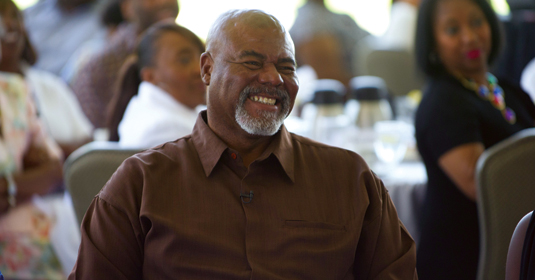 Petty Hunter doesn’t surrender. Not decades ago to the challenge of being the first African American to letter in football at Abilene High School. Not 12 years ago when he returned to his hometown to find Carver neighborhood decimated by crime and drugs. And not six months ago when this president of the local chapter of the NAACP and executive director of Abilene Neighborhoods in Progress experienced a stroke.
Petty Hunter doesn’t surrender. Not decades ago to the challenge of being the first African American to letter in football at Abilene High School. Not 12 years ago when he returned to his hometown to find Carver neighborhood decimated by crime and drugs. And not six months ago when this president of the local chapter of the NAACP and executive director of Abilene Neighborhoods in Progress experienced a stroke.
Hunter, an Abilene icon of service and rolled-sleeves involvement, received the Characters Unite Award in early August from USA Network and local distribution partner Suddenlink for his extraordinary efforts to transform developing Abilene neighborhoods and light the path of education for students who are vulnerable to academic struggles.
One of just 10 nationwide to win the award, Hunter accepted it Aug. 2 at the Williams Performing Arts Center at Abilene Christian University. Mayor Norm Archibald issued a proclamation creating Petty Hunter Day for the same date, and U.S. Rep. Randy Neugebauer’s district representative Marci Braden presented Hunter with a Congressional flag. The winners were selected from among hundreds of nominees for their significant efforts to champion civil and human rights in their communities. The honorees each received a $5,000 grant to support their projects or related nonprofit organizations. Hunter has given the grant to the Curtis House renovation project. The cultural museum, at 630 Washington St., will tell the stories of African-American individuals who have contributed to the city throughout its history.
Hunter said he believes the Curtis House will play an important role in the future of Abilene.
“I think that the better understanding that each culture of our community has of each other, that enables us to be a healthier community,” he said.
As the president of the Abilene chapter of the NAACP, Hunter has been asked by community leaders to help in closing the gap in academic achievement in the Abilene Independent School District and lowering school dropout rates. His education advocacy has led to the creation of AISD’s Closing the Gap Committee, which monitors social and academic indicators and then makes recommendations to the district’s administration. As part of his outreach to the younger generation, Hunter advises a group of local youth known as the Carver Youth Council. The group has been credited with taking an active anti-drug stand in the Carver neighborhood.
The Characters Unite Award is part of USA Network’s public service campaign launched in 2009 to target social injustice and cultural divides while promoting understanding and acceptance. The award’s name is inspired by USA’s “Characters Welcome” brand. Hunter is featured on-air in a PSA with the other honorees and online at charactersunite.com. The Abilene event presenting Hunter’s award was one of the campaign’s largest events to date, with more than 130 attendees, including the city manager, three city council members, two members of the Taylor County Commissioner’s Court, and the leaders of AISD, the Abilene Chamber of Commerce and ACU.
Things have slowed down for Hunter since February, when he experienced the stroke that left him visually impaired. He said he is steadily improving with the help and care of his wife, Tonya Jones-Hunter. She has played a major role in helping Hunter scale back on his involvement to speed his recovery.
“I can get carried away really easily,” Hunter said. “I am recovering slowly. I am exploring new activities now. I am getting a little more freedom every couple weeks.”
Hunter’s reaction to the award is a modest one. He said he believes the recognition he received is a credit to Abilene for fostering an environment in which he is welcomed to illuminate issues and advocate for change at all levels of the community.
“It’s significant,” he said. “It makes a lot of difference. That’s our community.”
Years ago as a student at Abilene High School, Hunter had been a member of the school’s first racially integrated class. After graduation he attended North Texas State University, now University of North Texas, and earned his degree from Texas Southern University in Houston. After nearly three decades with the City of Houston Parks and Recreation Department, Hunter retired and returned in 2001 to Abilene. When he found his old neighborhood deteriorated, and infiltrated by crime and drugs, Hunter committed himself to making a difference through advocacy and community service.
Hunter has served as executive director of the Abilene Neighborhoods In Progress community development organization, as treasurer of the Interested Citizens of Abilene North, as a member of Citizens United Against Disproportionality and Disparities, and as a board member of the Abilene Black Chamber of Commerce, the Community Foundation of Abilene and the Big Country Sports Hall of Fame. He also sits on numerous other committees.
Despite the enormous investment of time required by being a part of so many organizations, friends have often seen him visiting houses door-to-door with a lawn mower and gardening supplies.
“If you want to be a good leader, you have to be a good soldier,” Hunter said. “You just can’t sit up and go to the nice meetings in air conditioning. Sometimes you’ve got to get out and cut the grass. If you want to make things better, you’ve got to do something about it.”



























Leave a Reply